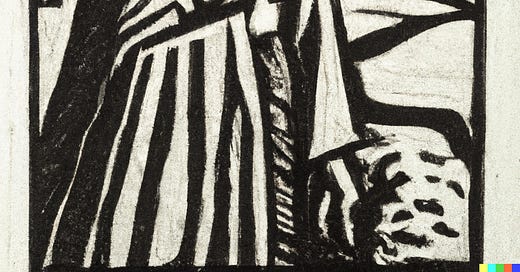Abba Agathon: On Grey Thinking
The immature mind sees things as either all bad or all good.
Abba Agathon was asked:
"Which is the greater: physical labor or interior vigilance?"
And the elder said:
"A person is like a tree; accordingly, physical labor is the leaves, interior vigilance the fruit.
Given that which is written: ‘Every tree not bearing good fruit is cut down and cast into the fire (Mt 7.19)’, it is clear that our entire concern is with the fruit, meaning the vigilance of the mind, but there is also need of the protection and ornamentation the leaves provide: these are physical labor."1
Here a young monk comes to the seasoned Abba Agathon2 much like my six-year-old daughter, asking a black and white question.
“Which is greater…?”
These questions are normal for my daughter, she hasn’t matured yet — but for a desert monk, it’s disastrous.
Black and white questions usually surface from a juvenile mind, one that has only learned to process in absolutes. That is, they assess in extremes. For example, they may:
see themselves as either all good or all bad at school
or they may see their physical appearance as either beautiful or repulsive
or they may see some idea as either all right or all wrong
In other words, the immature mind sees the world as a binary, an “either/or” place. But the world is not binary, it’s rich with nuance, diversity, and complexity.
Abba Agathon helps this young monk, not by giving him more precepts but a parable. A new precept would only reinforce his dichotomous thinking, but a parable has the possibility to heal his “splitting”3 tendency.
In other words, the parable ennobles both options the young monk has unwisely pitted against each other.
Physical labor is not better than interior vigilance — and — interior vigilance is not more necessary than physical labor. Neither is better than the other. They work together. They both have value.
In the spiritual life — and all of life — it's rare when an answer is “either/or.” It's almost always “both/and.”
With this parable, Agathon encourages his disciple to blend his black and white thinking into grey thinking.
If he’s going to make it in the desert he needs a subtle, nuanced, wise mind.
Don’t see polarities — I hear Agathon saying — see the continuum.
Give Me a Word: The Alphabetical Sayings of the Desert Fathers. United States: St. Vladimir's Seminary Press, 2014.
Abba Agathon was an ancient monk and spiritual leader of the Egyptian Desert Mothers and Fathers, who lived in the 4th century CE. He was renowned for his wisdom, compassion and kindness, and was a major influence on the early Christian monastic movement. He is most famous for his saying “Anytime you are tempted to judge, remember this: nothing is outside the mercy of God.” This quote highlights Agathon's unique approach towards understanding and compassion; a concept that has been influential in spiritual and philosophical discourse throughout the ages.
Splitting is a very common ego defense mechanism. It can be defined as the division or polarization of beliefs, actions, objects, or persons into good and bad by focusing selectively on their positive or negative attributes. Psychology Today




